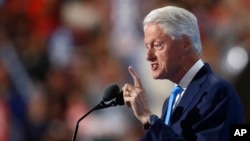Former U.S. President Bill Clinton defended his wife on Friday, saying the controversy about her use of a private email server is “the biggest load of bull I’ve ever heard.”
The former U.S. leader, responding to a question about Hillary Clinton’s trustworthiness at a forum sponsored by Asian-American organizations, said it would be ”inconceivable [that] all the prominent national security people, including Republicans, would have endorsed her” if they did not believe in her ability to protect secrets.
Bill Clinton asserted that the email issue tainting the former secretary of state’s campaign for the presidency involved a “long-running dispute between the State Department and the intelligence agencies” about the U.S. government's system of labeling sensitive information.
However, Bill Clinton acknowledged that the private server was a mistake that some of Hillary Clinton's predecessors as secretary of state also made, but “she should have known a different set of rules would apply to her if she ran for president.”
In his formal remarks, Clinton, who never mentioned Republican Party nominee Donald Trump by name, told a primarily Asian-American audience to elect his wife as the next president because she is “part and parcel of the American quilt of diversity” in a campaign to decide between “walls and bridges.”
'Heart' of this election
The former president said the election, 87 days away, would determine “if we’re going to be one country.”
“That is at heart what this election is about,” he said warning against “being mad, dividing the world up into us and them.”
Friday’s event, which also featured two minor party candidates, turned the spotlight on increasingly important Asian-American voters, once solidly Republican, who in the decades ahead are forecast to overtake Hispanics as the country’s largest minority bloc.
But that bloc is no longer solidified. A division has occurred among Southeast Asians, such as Filipinos and Vietnamese in the United States, and Chinese-Americans “due to the conflict in the South China Sea,” said Genie Giao Nguyen, chief executive officer of the Voice of Vietnamese Americans.
“However, we all look for one leader who has a strong stance in rule of law and will be able to make alliances with Indo-Asian Pacific nations,” Nguyen told VOA at the Las Vegas event.
President Barack Obama was re-elected in 2012 with the support of 73 percent of the 4 million Asian-American voters.
Voting allegiance
Vietnamese-Americans, for instance, traditionally voted for Republican candidates, Nguyen said, adding that younger members of the community are now “drifting to the values of the Democratic Party.”
Right now 40 percent of Vietnamese-Americans are undecided on whom to vote for in November, she added, underscoring her assertion that both of the major parties have yet to “pay attention to Asian-Americans compared to Latin-American and Middle-Easterners.”
Overall, Hillary Clinton has increased her lead against Trump in some of the most diverse battleground states, according to NBC/Wall Street Journal/Marist polls released Friday.
Trump was also invited to attend the event, organized by the Asian and Pacific Islander American Vote (APIAVote) and the Asian American Journalists Association (AAJA).
Utah Attorney General Sean Reyes was a stand-in at the forum for Trump, who was campaigning in Pennsylvania.
Trump’s tax, trade and education policies “will allow all Asian-Americans to achieve their American dream,” said Reyes, whose father emigrated from the Philippines.
Third-party candidates
Also participating in the forum were two other presidential candidates: Gary Johnson of the Libertarian Party and Jill Stein of the Green Party.
“I think there is a real possibility we might be in the presidential debates,” said Johnson who has broken into double digits in some battleground states, such as Colorado and Virginia, according to recent polls.
Johnson, a former Republican governor of New Mexico, rejected the assertion that choosing a third-party candidate at the ballot box would be a wasted vote.
“A wasted vote is voting for someone you don’t believe in,” he replied.
Stein is averaging 5 percent nationally, according to several polls, up from “close to invisible ... which I would say is pretty amazing,” noting that the two major-party candidates have been the beneficiaries of billions of dollars' worth of free media, while she has received almost none.
Presidential candidates who have the support of at least 15 percent of the electorate in five selected national public opinion polling organizations will be eligible to participate in three television debates to be held September 26, October 9 and 19.








